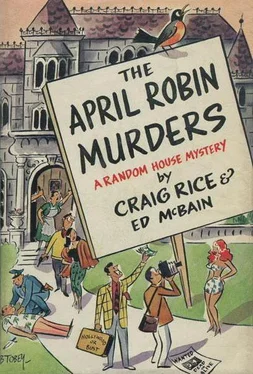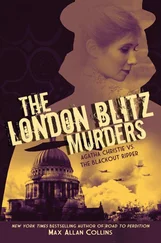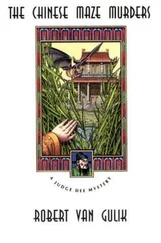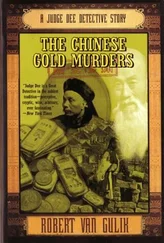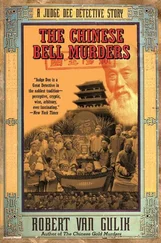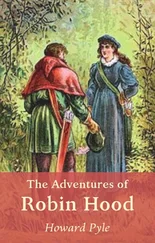Handsome displayed the prints with an artist’s pride. Leo Henkin examined them as though they were uranium samples. When he reached the last in the stack, Janesse Budlong in the demure little navy blue sheath, with the tiny white collar, his mouth formed into a silent “Oh.” He handed the prints on to Arthur Schlee and his secretary, looked at Bingo and sighed.
“This has been around Hollywood all this time,” he said. “And Leo Henkin never discovered her. Nobody” — he waved a hand indicating what he thought of those nobodies — “discovered her.”
“America was around for a long time, too,” Bingo said. “Until Columbus.” The unhappy look on Leo Henkin’s face hurt him. He went on quickly, “The American Indians didn’t discover it because they lived there. It took someone from out of town.”
Leo Henkin’s round face brightened. “That’s it,” he said, “it took two smart boys from out of town! Do you wonder, Arthur, why I’m so happy to do business with them? They’ve discovered a whole new continent!”
Handsome coughed and said, “She’s only a little over five three, and doesn’t weigh very much—”
“All right, all right,” Leo Henkin said. “We won’t call her a continent. Let’s say a jewel, a rare jewel. Who was it discovered the diamond fields in Africa—?”
Handsome started to answer, but Leo Henkin waved him down and went on. “Whoever it was, it probably wasn’t an African. Leo Henkin isn’t interested in history.” He flashed his most ingratiating smile and said, “Now, don’t you think you ought to tell your old friend Leo Henkin just what you plan to do with this rare jewel?”
“In a day or two,” Bingo said as nonchalantly as he could. In a few days any number of things could happen, but he didn’t want to think about them now. He searched his mind for a quick quote and said, “A rare jewel deserves a perfect setting.”
“When you’re ready,” Leo Henkin said, beaming. “When you’re ready. Remember, there’s nothing old Leo Henkin can’t do for you.”
There was another little silence. Joyce Grimstead cleared her throat and said, “I keep thinking of April Robin, here in this house—”
“That was a long time ago,” Bingo said. “Long, long before your time.”
“I know,” Joyce Grimstead said. “I never saw her on the screen. But whatever did happen to her? Doesn’t anyone know?”
In that next silence a pale, grayish ghost of April Robin seemed to move lightly through the room. Bingo closed his eyes for a moment.
It was Arthur Schlee who broke the spell. “My dear girl, in those days a lot of things were hushed up. April Robin—”
Arthur Schlee’s sentence was broken by the doorbell, by a light and silvery voice as Handsome opened the door.
“I’m so sorry to be late,” Janesse Budlong said. “I had to stop and change my dress and run a comb through my hair.”
From her appearance as she came into the room, she’d had the comb run through her hair at Westmore’s, and changed her dress at Magnin’s. But it was a simple hairdo, soft around her face, the mane of magnificently red hair simply knotted at the back and caught with a lime-green ribbon. The dress, of a soft shade of green Bingo couldn’t even try to identify, was so plain, so exquisite and so becoming, that he didn’t want to hazard a guess at its cost. The small fur she carried over her arm had probably cost the lives of an untold number of valuable little animals. She dropped it on the arm of the davenport as though it were an empty popcorn bag.
She looked delicate, she looked gentle, she looked simple and friendly, she looked expensive, she looked, by some magic of pose and smile, like a great actress.
“I don’t believe you know all these people—” Bingo began.
“Oh, but I do!” she said, with an all-embracing smile. “Mr. Schlee, how nice to see you again! Why, I don’t believe I’ve seen you since — some of those papers from my grandmother’s trust fund! I’ve never really thanked you for being so helpful! And Joyce, darling! We were always going to have lunch together and we just never did!” She turned to Bingo and said, “You know, Joyce was always so wonderful to me whenever I was in Mr. Schlee’s office! She was just a little kid, then—” Her smile implied that Joyce Grimstead had been about sixteen then, and couldn’t possibly be much more than twenty-one now.
Janesse turned slightly toward the other corner of the davenport and said, “Mr. Henkin! Oh, please sit down! If you knew — if I could just tell you — what it means meeting you! You have no idea how long I’ve admired you! I’ve always wished I had the nerve to call on you!”
“I wish you had,” Leo Henkin said. “Old Leo Henkin might not have made a star out of you, but he might have run you for president.”
Arthur Schlee said, “And now if you’ll just glance over these papers—” She sat down between him and Joyce Grimstead, took them and said, “I know if you drew them up, they’re all right,” but she looked at them just the same.
In the moment while she examined them, an echo of Bingo’s dream returned. The shadowy figures who blended into other shadowy figures, and all became the April Robin whose picture he had never seen, whose voice he had never heard, whose face, he felt sure now, he would never see, but whom everyone remembered, and no one would ever, ever forget. Then Janesse Budlong looked up, that sweet, half-tremulous little smile on her face.
“I don’t know,” she said softly. “This doesn’t seem to commit me to anything. And it does commit you to a lot.”
“If there are any changes—” Arthur Schlee began, in his lawyer’s voice.
She shook her lovely head. “No. Only it doesn’t seem fair. I just promise not to pose for photographs, or consider any picture jobs for a period of seven days. In return they agree to star me in their forthcoming production.” Her smile became even prettier and more modest. “I mean, it just doesn’t seem fair to them—”
Arthur Schlee, remembering fast who his clients were, said, “If this is agreeable to them—”
“Oh, sure,” she said, with that endearing lift of the lip. “Only it says here, ‘in consideration of one dollar’ — can we write in a phrase or something, that if anything goes wrong, I give them the dollar back?”
Leo Henkin took over. “Little Miss Janesse,” he said. “Old Leo Henkin knows this business. These boys are not gambling one dollar, they’re gambling” — he gave Bingo a questioning glance — “a fortune. Take old Leo Henkin’s advice. Sign it.”
She took the pen Bingo handed her, poised it daintily over the paper for a moment and then said, “I don’t know. Do you think the trade papers should be notified?”
Bingo said quickly, “Maybe a picture of you signing. Handsome can take it. Make some fast prints. And maybe our friend Leo Henkin can help out—”
Leo Henkin said, “Make the picture. Leo Henkin will see to it that the story gets out. Leo Henkin will make sure it’s a better story than Romulus and Remus running out of milk.”
Handsome set up the small camera, fast. Bingo said, “Wait a minute. Handsome—”
Handsome nodded, whipped into the kitchen and whipped back again with a tray of glasses, two bottles of champagne and two orchids.
“For you,” Bingo said softly, pinning one corsage on Janesse Budlong. “For a great future. And for you, my dear” — with a smile for Joyce Grimstead — “for being so helpful.”
Handsome poured the champagne. The contracts were signed in a flourish of flashbulbs and flowers. Bingo tried to sit back and relax. This was why they’d come to Hollywood, to sign a forthcoming star, to own — live in — a mansion, to be surrounded by agents, lawyers and flashbulbs.
Читать дальше
